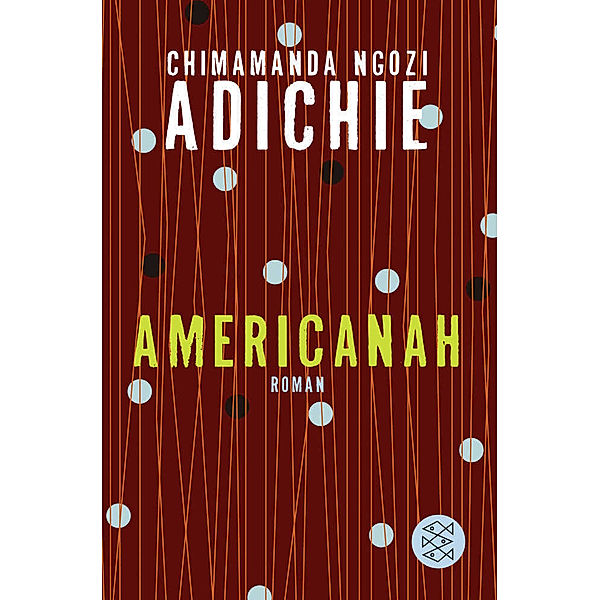Americanah
Roman. Ausgezeichnet mit National Book Critics Circle Award Fiction 2013
Eine einschneidende Liebesgeschichte zwischen drei Kontinenten - virtuos und gegenwartsnah erzählt von einer der grossen jungen Stimmen der Weltliteratur.
Chimamanda Adichie erzählt von der Liebe zwischen Ifemelu und Obinze, die im Nigeria der neunziger...
Chimamanda Adichie erzählt von der Liebe zwischen Ifemelu und Obinze, die im Nigeria der neunziger...
lieferbar
versandkostenfrei
Taschenbuch
Fr. 19.90
inkl. MwSt.
- Kreditkarte, Paypal, Rechnungskauf
- 30 Tage Widerrufsrecht
Produktdetails
Produktinformationen zu „Americanah “
Klappentext zu „Americanah “
Eine einschneidende Liebesgeschichte zwischen drei Kontinenten - virtuos und gegenwartsnah erzählt von einer der grossen jungen Stimmen der Weltliteratur.Chimamanda Adichie erzählt von der Liebe zwischen Ifemelu und Obinze, die im Nigeria der neunziger Jahre ihren Lauf nimmt. Dann trennen sich ihre Wege: Die selbstbewusste Ifemelu studiert in Princeton, Obinze strandet als illegaler Einwanderer in London. Nach Jahren stehen sie plötzlich vor einer Entscheidung, die ihr Leben auf den Kopf stellt. Adichie gelingt ein eindringlicher, moderner und hochpolitischer Roman über Identität und Rassismus in unserer globale Welt.
Lese-Probe zu „Americanah “
Princeton, in the summer, smelled of nothing, and although Ifemelu liked the tranquil greenness of the many trees, the clean streets and stately homes, the delicately overpriced shops, and the quiet, abiding air of earned grace, it was this, the lack of a smell, that most appealed to her, perhaps because the other American cities she knew well had all smelled distinctly. Philadelphia had the musty scent of history. New Haven smelled of neglect. Baltimore smelled of brine, and Brooklyn of sun-warmed garbage. But Princeton had no smell. She liked taking deep breaths here. She liked watching the locals who drove with pointed courtesy and parked their latest model cars outside the organic grocery store on Nassau Street or outside the sushi restaurants or outside the ice cream shop that had fifty different flavors including red pepper or outside the post office where effusive staff bounded out to greet them at the entrance. She liked the campus, grave with knowledge, the Gothic buildings with their vine-laced walls, and the way everything transformed, in the half-light of night, into a ghostly scene. She liked, most of all, that in this place of affluent ease, she could pretend to be someone else, someone specially admitted into a hallowed American club, someone adorned with certainty.But she did not like that she had to go to Trenton to braid her hair. It was unreasonable to expect a braiding salon in Princeton-the few black locals she had seen were so light-skinned and lank-haired she could not imagine them wearing braids-and yet as she waited at Princeton Junction station for the train, on an afternoon ablaze with heat, she wondered why there was no place where she could braid her hair. The chocolate bar in her handbag had melted. A few other people were waiting on the platform, all of them white and lean, in short, flimsy clothes. The man standing closest to her was eating an ice cream cone; she had always found it a little irresponsible, the eating of ice cream
... mehr
cones by grown-up American men, especially the eating of ice cream cones by grown-up American men in public. He turned to her and said, "About time," when the train finally creaked in, with the familiarity strangers adopt with each other after sharing in the disappointment of a public service. She smiled at him. The graying hair on the back of his head was swept forward, a comical arrangement to disguise his bald spot. He had to be an academic, but not in the humanities or he would be more self-conscious. A firm science like chemistry, maybe. Before, she would have said, "I know," that peculiar American expression that professed agreement rather than knowledge, and then she would have started a conversation with him, to see if he would say something she could use in her blog. People were flattered to be asked about themselves and if she said nothing after they spoke, it made them say more. They were conditioned to fill silences. If they asked what she did, she would say vaguely, "I write a lifestyle blog," because saying "I write an anonymous blog called Raceteenth or Various Observations About American Blacks (Those Formerly Known as Negroes) by a Non-American Black " would make them uncomfortable. She had said it, though, a few times. Once to a dreadlocked white man who sat next to her on the train, his hair like old twine ropes that ended in a blond fuzz, his tattered shirt worn with enough piety to convince her that he was a social warrior and might make a good guest blogger. "Race is totally overhyped these days, black people need to get over themselves, it's all about class now, the haves and the have-nots," he told her evenly, and she used it as the opening sentence of a post titled "Not All Dreadlocked White American Guys Are Down." Then there was the man from Ohio, who was squeezed next to her on a flight. A middle manager, she was sure, from his boxy suit and contrast collar.
... weniger
Autoren-Porträt von Chimamanda Ngozi Adichie
Chimamanda Ngozi Adichie ist eine der grossen Stimmen der Weltliteratur. Ihr Werk wird in 37 Sprachen übertragen. Für »Americanah« erhielt sie 2013 den Heartland Prize for Fiction und den National Book Critics Circle Award. Ihr Roman »Blauer Hibiskus« war für den Booker Prize nominiert, »Die Hälfte der Sonne« erhielt den Orange Prize for Fiction 2007. Mit ihrem TED-Talk »We should all be Feminists« verankerte die Nigerianerin den Feminismus fest in der Popkultur. Auf Deutsch liegt der Text im FISCHER Taschenbuch vor: »Mehr Feminismus! Ein Manifest und vier Stories«. Zuletzt erschien 2017 im FISCHER Taschenbuch »Liebe Ijeawele. Wie unsere Töchter selbstbestimmte Frauen werden«. 2018 wurde Chimamanda Ngozi Adichie mit dem PEN Pinter Prize und dem Everett M. Rogers Award ausgezeichnet. 2019 wurde ihr der Kasseler Bürgerpreis »Das Glas der Vernunft« verliehen. 2020 erhielt sie den Internationalen Hermann-Hesse-Preis für »Blauer Hibiskus«. Chimamanda Ngozi Adichie wurde 1977 in Nigeria geboren und lebt heute in Lagos und in den USA. Grube, AnetteAnette Grube, geboren 1954, lebt in Berlin. Sie ist die Übersetzerin von Arundhati Roy, Vikram Seth, Chimamanda Ngozi Adichie, Mordecai Richler, Kate Atkinson, Monica Ali, Manil Suri, Richard Yates u.a.
Bibliographische Angaben
- Autor: Chimamanda Ngozi Adichie
- 2017, 10. Aufl., 608 Seiten, Masse: 12,8 x 19,2 cm, Taschenbuch, Deutsch
- Übersetzer: Anette Grube
- Verlag: FISCHER Taschenbuch
- ISBN-10: 359618598X
- ISBN-13: 9783596185986
- Erscheinungsdatum: 30.06.2015
Rezension zu „Americanah “
Adichie hat wahrhaft einen Weltroman geschrieben, der uns Begriffe einer Menschenkenntnis an die Hand gibt, die überall funktioniert, ohne je schablonenhaft zu sein. Ijoma Mangold Die Zeit 20140515
Pressezitat
Adichie hat wahrhaft einen Weltroman geschrieben, der uns Begriffe einer Menschenkenntnis an die Hand gibt, die überall funktioniert, ohne je schablonenhaft zu sein. Ijoma Mangold Die Zeit 20140515
Kommentar zu "Americanah"
0 Gebrauchte Artikel zu „Americanah“
| Zustand | Preis | Porto | Zahlung | Verkäufer | Rating |
|---|







5 von 5 Sternen
5 Sterne 1Schreiben Sie einen Kommentar zu "Americanah".
Kommentar verfassen